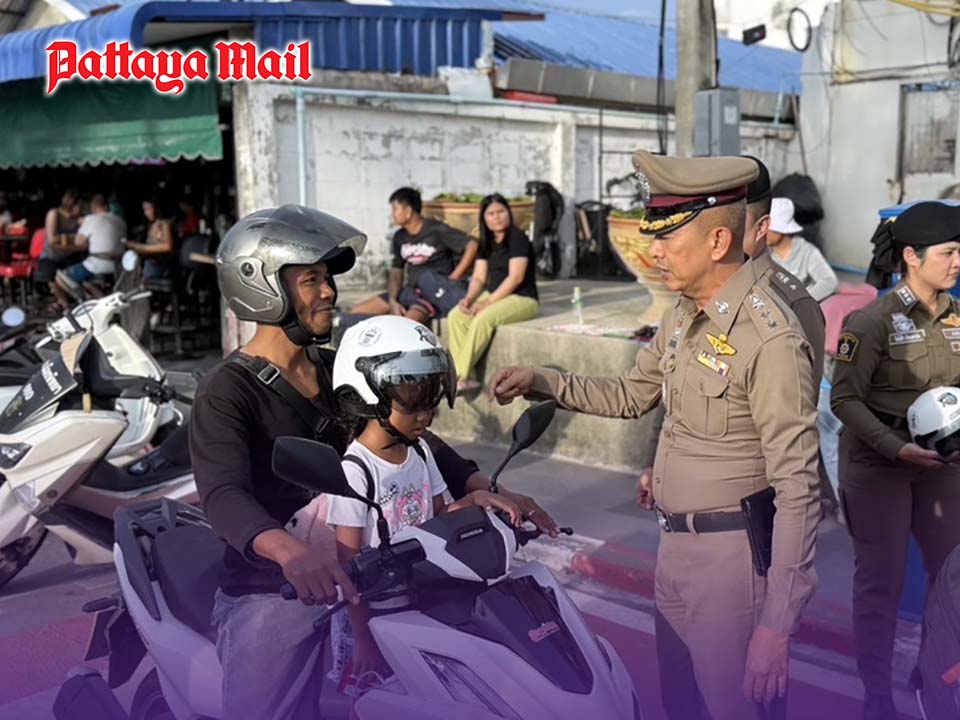Pattaya gets tough on helmets with 2,000 baht fine — but some say it’s not enough
Pattaya Enforces Helmet Law as Part of Nationwide Road Safety Push — Motorcyclists Face 2,000 Baht Fines in New Effort to Curb Fatalities and Restore Order
PATTAYA, Thailand – Pattaya has become a front-line zone in Thailand’s newly launched “Safe Roads Project,” a nationwide traffic enforcement campaign rolled out on June 1. The campaign aims to curb the alarming number of road fatalities—particularly those involving motorcycles, which account for over 80% of all road deaths in the country.
As part of the crackdown, traffic police in Pattaya and nearby Banglamung district have stepped up patrols at key intersections and along major roads. Officers are now strictly enforcing Section 122 of the Land Traffic Act, which mandates that both motorcycle drivers and passengers wear helmets at all times. Violators face fines of up to 2,000 baht for drivers and up to 4,000 baht for passengers, with additional penalties for drivers carrying unhelmeted riders.
“Public safety must come first,” said Deputy National Police Chief Pol. Gen. Kraiboon Suadsong, who confirmed that the Royal Thai Police are coordinating enforcement across 95 designated zones nationwide—including Pattaya, Bangkok, Samut Prakan, and Bang Saen.
In Pattaya, where helmet compliance has historically been inconsistent, police have already been seen pulling over non-compliant riders, issuing warnings, and in some cases, tickets. Locals and tourists alike are being reminded that no helmet means no excuses—and now, a costly fine.
Public Reaction: Applause, Criticism, and Realism
The campaign has drawn a flurry of public comments—some supportive, others skeptical.
“Wearing helmets doesn’t prevent accidents, it prevents injuries,” one resident said. “To prevent accidents, you need to catch those who drive recklessly, speed, or drive under the influence. Then implement hefty fines and a point system, similar to the UK.”
Others questioned whether enforcement would be meaningful at all without broader reforms:
“First, you need a police force,” one comment bluntly noted.
“Out here in the Pisanulok area, it’s operations normal. Local cops will not do this.”
“First they have to get the police to work after 5 p.m.—that’s when most of the accidents happen. After 6 p.m. almost nobody wears a helmet and the population knows it.”
Some users suggested the campaign was misplaced:
“It’s not the helmets, check the tires—most are bald with cords showing. Tires first, helmets last. The safety checks are a joke here.”
Corruption also came up in the conversation:
“How about if the police officers take bribes? How will they be penalized? Because they are the ones who allow this to happen and turn a blind eye.”
Infrastructure issues weren’t ignored either:
“How about fixing the roads?” asked a resident of Khao Noi. “I don’t think Thais got the memo in Khao Noi and Khao Talo.”
Others took a more ideological stance:
“If you want a big brother state, go back to the UK, Australia, or Canada. Freeland is called this for a reason.”
“Then again, not wearing a helmet can remove the possibility of future accidents!”
Despite differing opinions, one thing is certain: Thailand’s traffic safety culture is under scrutiny.
Government agencies—including the Department of Highways, Bangkok Metropolitan Administration, and provincial authorities—are expected to support the campaign in tandem with police efforts. Education campaigns are also being encouraged to reach young people and rural communities.
Whether the campaign can move beyond temporary roadblocks and sporadic checks to meaningful, sustained change remains to be seen. As one local summed up: “Teach children, educate people—that’s the real long-term fix.”



